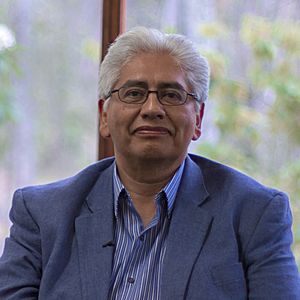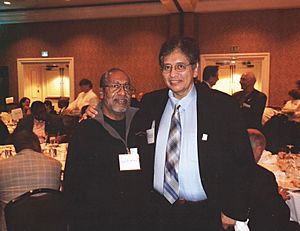Carlos Castillo-Chavez facts for kids
Quick facts for kids
Carlos Castillo-Chavez
|
|
|---|---|

Castillo-Chavez in 2017
|
|
| Born | March 29, 1952 |
| Alma mater | University of Wisconsin–Madison (PhD) University of Wisconsin–Stevens Point (B.A.) |
| Scientific career | |
| Fields |
|
| Institutions |
|
| Thesis |
|
| Doctoral advisor | Fred Guenther Brauer |
| Doctoral students | Gerardo Chowell |
Carlos Castillo-Chavez (born March 29, 1952) is a famous Mexican-American mathematician. He is known for using math to study how diseases spread. He was a top professor at Arizona State University.
Castillo-Chavez also started a special program for students. It is called the Mathematical and Theoretical Biology Institute (MTBI). He founded it at Cornell University in 1996. His work helps us understand how math can explain the world around us. This includes diseases, how people live together, and more.
Contents
Early Life and Education
Carlos Castillo-Chavez was born in Mexico on March 29, 1952. When he was 22 years old, he moved to the United States. Before becoming a famous professor, he worked in a cheese factory in Wisconsin.
He never gave up on his dream of learning. He went to the University of Wisconsin–Stevens Point. In 1976, he graduated with degrees in both math and Spanish literature. He continued his studies and earned a master's degree and a Ph.D. in mathematics.
Before teaching at Arizona State University, he was a professor at Cornell University for 18 years. He has written many scientific articles and books. He has also helped important groups like the National Science Foundation and the National Institutes of Health.
Using Math to Understand Diseases

Castillo-Chavez is a mathematical epidemiologist. This means he uses math to study how diseases spread. His research helps scientists understand how to stop or prevent illnesses. He creates mathematical models, which are like special equations. These models can show how a disease might travel through a community.
His work has looked at diseases like Ebola, influenza, and the Zika virus. He studies how people's actions, like traveling, can affect how quickly a disease spreads. He also studies how ideas and information spread, similar to how a virus does.
Helping Students Succeed
One of Castillo-Chavez's biggest goals has been to help students. He has been a mentor to hundreds of students throughout his career. He is especially known for helping students from groups that are often underrepresented in math and science.
In 1996, he founded the Mathematical and Theoretical Biology Institute (MTBI). This program gives students a chance to do real research in math and biology. Many students who went through his programs have become successful scientists themselves.
Because of his dedication to helping students, he is listed as one of the top advisors for math students in the country.
Awards and Honors
Dr. Castillo-Chavez has received many awards for his work as a scientist and a mentor.
- He received three awards from the White House for his work in mentoring students.
- In 2010, the American Mathematical Society gave him an award for his service to the public.
- In 2007, he won the Mentor Award from the American Association for the Advancement of Science (AAAS).
- He served on President Barack Obama's Committee on the National Medal of Science from 2010 to 2015.
- A university in El Salvador named its math center after him in 2016.
Selected Books
Dr. Castillo-Chavez has co-written many books to share his knowledge. Here are a few of them:
- Mathematical Models in Epidemiology (2019)
- Mathematical Models for Communicable Diseases (2013)
- Mathematical models in population biology and epidemiology (2001)
See also
 In Spanish: Carlos Castillo-Chavez para niños
In Spanish: Carlos Castillo-Chavez para niños
 | George Robert Carruthers |
 | Patricia Bath |
 | Jan Ernst Matzeliger |
 | Alexander Miles |

